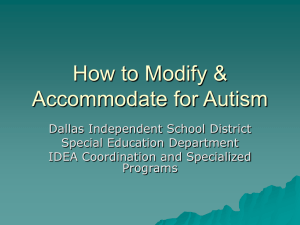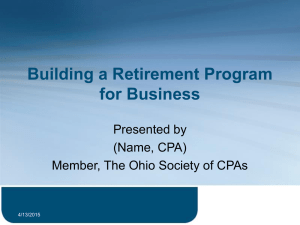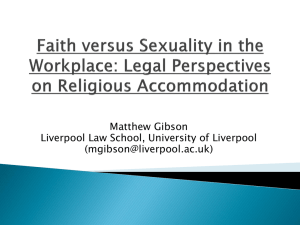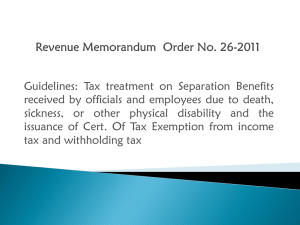here - Employment Law Alliance
advertisement
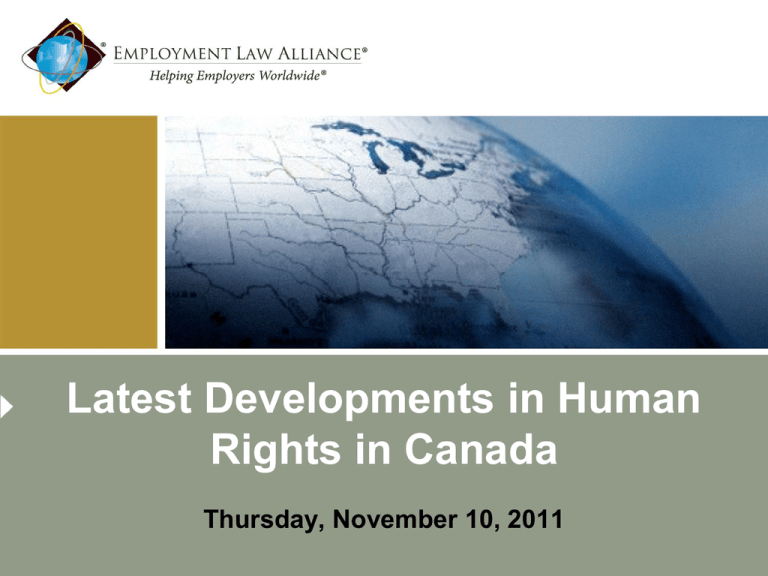
Latest Developments in Human Rights in Canada Thursday, November 10, 2011 Presenters Moderator Stephen J. Hirschfeld, CEO, Employment Law Alliance; Partner, Curiale, Hirschfeld, Kraemer LLP, San Francisco, CA shirschfeld@employmentlawalliance.com 2 Speakers Nancy F. Barteaux, Partner. Ritch Durnford Lawyers, Halifax, Nova Scotia nancy.barteaux@ritchdurnford.com Michel Gélinas, Partner, Lavery, de Billy, S.E.N.C.R.L./L.L.P., Montreal, Quebec mgelinas@lavery.ca 3 Speakers Teresa F. Haykowsky, Partner, McLennan Ross, Edmonton, Alberta thaykowsky@mross.com Gregory J. Heywood, Partner, Roper Greyell LLP, Vancouver, British Columbia gheywood@ropergreyell.com 4 Speakers Erin Kuzz, Partner, Sherrard Kuzz LLP, Toronto, Ontario ekuzz@sherrardkuzz.com Grant Mitchell, Partner, Taylor McCaffrey LLP,Winnipeg, Manitoba gmitchell@tmlawyers.com 5 Application/Complaint Process • Gatekeeper jurisdictions: – All jurisdictions other than B.C. and Ontario – Body in place (frequently called ‘Commission’) to act as gatekeeper – Performs investigative function – Determines whether complaint proceeds to hearing 6 Application/Complaint Process • Gatekeeper jurisdictions (cont’d): – Vast majority of complaints either settled, or commission declines to refer to hearing – Only after complaint passes gatekeeping, does it process to hearing process 7 Application/Complaint Process • Direct access jurisdictions: – In Ontario and B.C. there is no formal “gatekeeper” function; Applicants have “direct access” to Tribunal for a hearing – Access to a “hearing” effectively guaranteed o Format of “hearing” defined broadly, including hearing in writing 8 Application/Complaint Process • Direct access jurisdictions (cont’d): – Ability to seek dismissal without hearing on merits – Reasons may include outside Tribunal jurisdiction (i.e., federal employer), timeliness, subject matter already appropriately dealt with, doesn’t disclose Code violation 9 Impact of Process • Process faster in direct access jurisdictions – Matters in hearing within months, not years – Employers required to provide more complete Responses earlier in process (including witness statements in Ontario) 10 Application/Complaint Process • More complaints proceed to hearing – Limited ability to seek dismissal without hearing – Failing settlement, complaints proceed to hearing as of right 11 Application/Complaint Process • Employers in direct access jurisdictions need to be more strategic in planning terminations – Cannot assume any complaint, if filed, will be years in process 12 Definition of Employer - ABCA • Lockerbie & Hole industrial Inc. v. Alberta (Human Rights and Citizenship Commission, Director), 2011 ABCA 3 – Facts – Principles – Implications 13 Knowledge of Prerequisite to Discrimination • Burgess v. Stephen N. Huk Professional Corporation, 2010 AB QB 424 – Facts – Principles – Implications 14 Duty to Accommodate • The Test – Employee establishes a prima facie case of discrimination based on disability ↓ – Onus shifts to Employer to show that the discriminatory practice is a bona fide occupational requirement or qualification. The Employer must meet a 3-part test (Supreme Court of Canada’s Meiorin decision in 1999): 15 Duty to Accommodate 1. Show that the standard was adopted for a purpose which is rationally connected to the performance of the job; 2. Establish that the standard was based upon an honest and good faith belief that it was necessary for a legitimate work-related purpose; and 3. Establish that the standard was necessary to accomplish a legitimate work-related purpose. Must demonstrate that employees with these characteristics cannot be accommodated without imposing undue hardship on the employer. 16 Duty to Accommodate • The Test (cont’d) – Employer must individually assess the employee and the appropriate accommodation (flexibility and creativity help). – Employer has to obtain all relevant information about the employee’s disability. 17 Duty to Accommodate • Recent Supreme Court of Canada cases. – McGill University Health Centre (Montreal General Hospital) v. Syndicat des employes de l’Hopital general de Montreal, 2007 SCC 4: an automatic termination provision in a collective agreement is an indication of what the parties think is a “reasonable” amount of time to accommodate an employee. 18 Duty to Accommodate – Hydro-Québec v. Syndicat des employées de techniques professionnelles et de bureau d’Hydro-Québec, section locale 2000 (SCFP-FTQ), 2008 SCC 43: after many years of accommodation, termination was appropriate where there was no indication that the employee would ever return to work on a consistent basis. Employer does not have a duty to change working conditions in a fundamental way. Its duty to accommodate ends when the employee is no longer able to fulfill the basic obligations of employment. 19 Duty to Accommodate • Notable developments in the past year – Duty to accommodate is triggered not just when an employee asks for accommodation, but where the employee “appears” to require accommodation, especially in cases of mental disability. The test is whether an employer “knew or ought to have known” that an employee required accommodation. (Frederick Semeniuk v Weston Bakeries Ltd (2010), CHRR Doc 10-3551 (Sask HRT)) 20 Duty to Accommodate • Notable developments in the past year (cont’d) – Employees can’t insist on a particular form of accommodation and no other (PO v. Canada Revenue Agency, 2010 PSLRB 40 and JR v Saskatchewan (Environment) (2010), CHRR Doc 10-1274 (Sask HRT) 21 Duty to Accommodate • Notable developments in the past year (cont’d) – Duty to accommodate applies to hiring processes, too. In Ontario, effective July 1, 2011, under a new regulation called the “Integrated Accessibility Standard” under the Accessibility for Ontarians with Disabilities Act, employers are required to make employees and potential employees aware of the possibility of accommodation during the recruitment process and thereafter. 22 Duty to Accommodate • Does it matter that the injury occurred at work? – Employers have a duty to accommodate under workers’ compensation legislation in Ontario, Nova Scotia, PEI and Newfoundland, and Labrador. o Employers are required (whenever possible) to return a worker to his/her preinjury employment. 23 Duty to Accommodate • Does it matter that the injury occurred at work (cont’d)? o The employer’s re-employment obligation exists for 2 years after an employee’s return to work. o When an employee is terminated within 6 months of re-employment, there is a rebuttable presumption that the employer terminated because of the workplace injury. 24 Duty to Accommodate • “Workplace stress” – does an employer have to accommodate? – “Stress” is not a disability, unless the employee provides medical evidence of a specific diagnosis and that s/he is unable to carry out daily functions. o Vandale v Town of Golden, 2009 BCHRT 219 o Skytrain BC Rapid Transit v CUPE Local 7000 (Olsen Grievance), 2009 BCCAAA No 85 25 Duty to Accommodate • “Workplace stress” (cont’d) o Wall v the Lippe Group (cob Hubert Lippe Enterprises Ltd), [2008] OHRT No 47 o Halliday v. Michelin North America (Canada) Ltd., 2006 NSHRC 5 26 Duty to Accommodate • “Workplace stress” (cont’d) – Under workers’ compensation legislation, workplace injuries related to stress are limited to “traumatic events.” – BUT this limitation was found to violate the “no discrimination” provision (s. 15) of the Canadian Charter of Rights and Freedoms and human rights legislation in B.C. o Plesner v. British Columbia Hydro and Power Authority, 2009 BCCA 188 o The same issue is being considered in Ontario (Decision No. 480/11, 2011 ONWSIAT 1032) 27 Accommodation • Privacy of medical information – legal backdrop for Quebec – The Charter of Human Rights and Freedoms o “5. Every person has a right to the respect of his private life.” – The Civil Code of Quebec o “35. Every person has a right to the respect of his reputation and privacy. No one may invade the privacy of a person without the consent of the person unless authorized by law.” 28 Accommodation • Cont’d – The Act respecting the Protection of Personal Information in the Private Sector o Privacy legislation - one of the first of its kind in Canada; o Establishes specific rules for the protection of personal information, notably in respect of collection, use and communication to third persons; o Applies to all private legal entities carrying on a business in Quebec; 29 Accommodation • Cont’d o Basic rule: consent is required for collection, use or communication of personal information – “14. Consent to the collection, communication or use of personal information must be manifest, free, and enlightened, and must be given for specific purposes. Such consent is valid only for the length of time needed to achieve the purposes for which it was requested. – Consent given otherwise than in accordance with the first paragraph is without effect.” 30 Accommodation • Employee privacy rights must be balanced with employer obligations – The Charter of Human Rights and Freedoms o “46. Every person who works has a right, in accordance with the law, to fair and reasonable conditions of employment which have proper regard for his health, safety and physical wellbeing.” 31 Accommodation • Cont’d – The Civil Code of Quebec o “2087. The employer is bound not only to allow the performance of the work agreed upon and to pay the remuneration fixed, but also to take any measures consistent with the nature of the work to protect the health, safety and dignity of the employee.” – The Act respecting Occupational Health and Safety o “51. Every employer must take the necessary measures to protect the health and ensure the safety and physical well-being of his worker. (…)” 32 Accommodation • Cont’d – The Labour Standards Act o “81.19. Every employee has a right to a work environment free from psychological harassment. o Employers must take reasonable action to prevent psychological harassment and, whenever they become aware of such behaviour, to put a stop to it.” 33 Accommodation • Cont’d – The Act respecting the Protection of Personal Information in the Private Sector provides for exceptions: o “20. In the carrying on of an enterprise, authorized employees, mandataries or agents or any party to a contract for work or services may have access to personal information without the consent of the person concerned only if the information is needed for the performance of their duties or the carrying out of their mandates or contracts.” 34 Accommodation • Employers in Quebec are entitled to request and obtain medical information, which employees are compelled to give in the context of the accommodation process. • Part of management rights; not construed as a violation of employee privacy rights, unless clearly abusive; • Medical certificates should be complete and include a diagnosis and prognosis; 35 Accommodation • Employees may be required to instruct a treating physician to provide the employer with any additional information concerning the employee’s health condition • Employees may be required to undergo an independent medical examination, without consent, to provide the employer with sufficient information to: – validate reason for and length of absence from work – appreciate temporary or permanent physical or psychological limitations upon returning to work 36 Accommodation • Refusal to collaborate in this respect is insubordination and could lead to imposition of discipline • Employees may also be required to undergo an independent medical examination, without consent, after a work-related accident has occurred 37 Accommodation • Medical personnel of the employer (e.g., health or nursing service, human resources managers and relevant management as the case may be) may access this information without the employee’s consent if it is needed in the performance of their duties • These duties may include accommodating the employee further; assessing the need to modify workspace, work tasks, etc., for which complete medical information is required 38 Discrimination Based on Ethnic and National Origin • Anticipated upcoming human rights issues in Quebec – Complaints of discrimination based on ethnic or national origin due to application in Canada of foreign standards, notably U.S. national security regulations (i.e. U.S. Department of Justice, Department of Homeland Security, Department of Transportation or Defense rules that workers of specifically identified national origins not be employed or assigned to work on specific projects by Canadian employers). 39 Discrimination Based on Ethnic and National Origin • Anticipated upcoming human rights issues in Quebec (cont’d) – Under these types of regulations, dual and third country national employees of a foreign person are restricted in employment when the product being manufactured is defence-related and destined to export to the U.S. Failure to comply could lead to serious business consequences to the employer. – There is currently no case law dealing with such a specific complaint of discrimination in the context of employment in Quebec 40 Discrimination Based on Ethnic and National Origin • Anticipated upcoming human rights issues in Quebec (cont’d) – But...the recent decision of the Human Rights Tribunal in the Human Rights Commission v. Bombardier inc., [2011] R.J.Q. 225 decision, is a strong indication of how these may be considered. – This particular decision was not based on an employment agreement, but on the refusal to “make a juridical act concerning services ordinarily offered to the public” for discriminatory reasons. 41 Discrimination Based on Ethnic and National Origin • Factual Background – Canadian pilot of Pakistani origin was refused flight training on Challenger 604 planes by the Bombardier Aerospace Training Centre (BATC) in Quebec – Pilot did not clear safety check of the United States Federal Aviation Administration to obtain U.S. flight licence, as required by the “Alien Flight Students Program” administered by the U.S. Department of Homeland Security 42 Discrimination Based on Ethnic and National Origin • Factual Background (cont’d) – Pilot applied for same training under a Canadian flight licence instead – This licensing process is not subject to the same type of national security regulations in Canada – BATC still denied training under Canadian flight licence on the basis that pilot was refused a U.S. licence because he was likely a potential terrorist, thus also a threat to Canadian national security and aviation security in general 43 Discrimination Based on Ethnic and National Origin • Factual Background (cont’d) – BATC argued its decision to discriminate was justified, rational, and reasonable because of Canadian national security concerns, and because BATC is required to comply with U.S. regulations failing which its American training certificate could be revoked, causing economic and social harm to its employees 44 Discrimination Based on Ethnic and National Origin • Decision of Human Rights Tribunal – BATC’s decision to deny training was a violation of the Charter of Human Rights and Freedoms and constituted discrimination based on national or ethnic origin – This decision is not rational or reasonable, as the application of U.S. standards where Canadian standards are inexistent cannot be justified. BATC took national security matters into its own hands, and it was not its place to do so 45 Discrimination Based on Ethnic and National Origin • Decision of Human Rights Tribunal (cont’d) – BATC’s position that the revocation of its U.S. training certificate would cause economic and social harm to its employees is also unsustainable in this case. – Maintaining employment and the economic viability of a business can be considered in analyzing what is a “rational objective” or justification for a measure; in this case, American laws on U.S. national security find no application in Canada, and a Canadian flight licence was at issue 46 Discrimination Based on Ethnic and National Origin • Decision of Human Rights Tribunal (cont’d) – The Complainant was notably awarded $25, 000 in moral damages, $50, 000 in punitive damages, and BATC was ordered not to consider U.S. security standards in dealing with training requests under Canadian licences – Undeniably, this decision can have a serious impact on employers in Quebec in the future, and will raise legal issues concerning pre-employment background checks 47 Mandatory Retirement • Until recently, most provinces in Canada defined "age discrimination" as limited to between the ages of 18 and 65. • This allowed employers (and unions) to compel employees to retire at 65. • Manitoba was an exception and never permitted this. 48 Mandatory Retirement • Other provinces have now joined Manitoba in prohibiting mandatory retirement, other than in exceptional circumstances. • Even where mandatory retirement is not generally allowed, employers can still force an employee out of his/her position if factors related to age give the employer bona fide and reasonable cause to end employment or at least that particular role 49 Mandatory Retirement • Example: Espey, a firefighter (District Chief) in London, ON, who did not want to retire at age 60, lost his human rights complaint due to the increased cardiac risk associated with age. – Collective agreement required retirement at age 60 – Human rights trumps collective agreements – Espey complained against both the employer and the union – He claimed that his cardiac condition was excellent 50 Mandatory Retirement • The adjudicator ruled that the probabilities should be determined by overall research, rather than the individual condition of the complainant – There was still no individual testing method that would allow a better risk assessment of on-the-job events for firefighters more accurately than age, given occupational-related risks – Mandatory retirement was therefore necessary to accomplish the employer's health and safety purpose; to modify would cause undue hardship 51 Mandatory Retirement • Example: case presently going to adjudication in Manitoba regarding firefighter mandatory retirement – Platoon Chief forced to retire at age 65 – Commission claims he is not as involved in fire suppression as a District Chief in London – No provision in collective agreement mandating retirement – Both employer and union are respondents 52 Mandatory Retirement • Cont’d – Commission says forced retirement would be wrong at any age – Commission wants individual health assessment to support complaint – Employer and union have offered alternate roles as accommodation, as long as fire suppression is not part – complainant rejects 53 Mandatory Retirement • Example: Recent cases at Air Canada for pilots regarding forced retirement at age 60 – Safety risk, cost, and business efficiency were the key considerations on undue hardship in all cases – Decisions have gone both ways, but latest decision in July 2011 supported forced retirement 54 Mandatory Retirement • Cont’d – Air Canada subject to international rule making it mandatory for pilots age 60-65 to fly with another pilot under age 60 – safety rationale – Air Canada argued it could not schedule in accordance with this international safety rule unless it maintained mandatory retirement at 60 – Would otherwise incur significantly increased operational costs, inefficiency in scheduling, negative ramifications to pension plan – Adjudicator (in 2011) agreed it would be an undue hardship to incur these negative consequences 55 Mandatory Retirement • Legislatures trying to address some of these issues • New amendments to Ontario's Fire Protection and Prevention Act came into force June 1, 2011 • Allows mandatory retirement at age 60 for Ontario's salaried firefighters who respond to emergency calls • Municipalities have two years to negotiate a retirement provision at age 60 or collective agreement will be deemed to include a provision requiring retirement at age 60 56 Family Status • The beginning – Campbell River & North Island Transition Society v. Health Sciences Assn. of British Columbia (Howard Grievance) 2002 o …” I have found that the words "family status" refers to the status of being a parent per se, and not to the innumerable (and yet important) circumstances that arise for all families in regard to their daycare needs” (emphasis added) 57 Family Status • The beginning (cont’d) o In other words, the Arbitrator rejected the view that there is a prima facie discrimination on the basis of family status whenever there is a conflict between a family obligation and a work requirement 58 Family Status • The Appeal (British Columbia Court of Appeal) – “…a prima facie case of discrimination is made out when a change in a term or condition of employment imposed by an employer results in a serious interference with a substantial parental or other family duty or obligation of the employee. I think that in the vast majority of situations in which there is a conflict between a work requirement and a family obligation it would be difficult to make out a prima facie case” 59 Family Status • Johnstone v. Canada (Attorney General), 2007 FC 36, aff’d [2008] FCA 101; [2010] CHRT 20 – The Court rejects the suggestion set out in Campbell River that prima facie discrimination will arise only where the employer changes the conditions of employment and states that such a proposition is wrong in law – Observes that, while family status can raise unique problems in law, no obvious justification for relegating this type of discrimination to a secondary or less compelling status 60 Family Status • Ontario – Alliance Employees Union, Unit 15 v. Customs and Immigration Union (Loranger Grievance) (2011) – The Arbitrator accepts that interference with parental obligations can constitute discrimination on the basis of family status if a prima facie case of discrimination is made out – There must be a “serious interference with a substantial parental obligation.” 61 Family Status • Ontario – Examination of the prima facie test (Loranger continued) – The Arbitrator rejected the Union’s position that simply because it would cause no undue hardship to the employer, it had a duty to grant the grievor’s request: o [57] “In my view, that analysis places the cart before the horse and, as was noted in Johnstone, conflates the BFOR test with whether there is a prima facie case of discrimination. Absent a substantial interference with his parental or marital obligations, no duty arose, whether it be easy, difficult or undue hardship” 62 Family Status • Implications? 63 Damages • Walsh v. Mobil Oil Canada, 2010 AHRC 9 – Facts – Principles – Implications 64 Damages • Hay River & Social Services Authority v. PSAC (Dalton Grievance) [2010] ABAA No. 4 – Facts – Principles – Implications 65 Family Status – Union Environment • Jurisdiction – HR Complaints in a Unionized Work Place – Halfyard v. City of Calgary, 2011 AHRC 5 – Calgary (City) v. Alberta (Human Rights and Citizenship Commission) 2011 ABCA 65 – AUPE v. Alberta (Graham Grievance) [2010] AGAA No. 10 • Tips and takeaways 66 Please Complete Our Survey Please take a few minutes to complete the survey that should appear on your computer screen immediately after you disconnect from the webinar. To listen to this webinar again or to any past ELA webinars, please register on our website at: www.employmentlawalliance.com. The ELA is not able to give CLE/HRCI/SHRM credit for its webinars; however, a Certificate of Attendance and supporting materials are now posted on the ELA website (click this webinar’s title and scroll down to the link). Attendees seeking HRCI or SHRM credit should submit the materials directly to HRCI at www.hrci.org or to SHRM at www.shrm.org. 67



